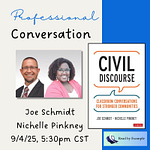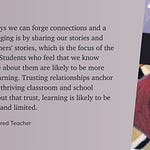Leading schools in the 21st century can be overwhelming. More is being added to our plates while our resources and time feel depleted.
In a highly complex world, a framework for leading schools is needed. Devin Vodicka, author of Learner-Centered Leadership, offers “A Blueprint for Transformational Change in Learning Communities.”
We talk about this topic, including:
why trust is foundational,
how schools can see the whole child, and
why both teachers and students need to be empowered for this work.
A 20th century education model still exists in too many schools. This episode introduces a pathway leaders can follow toward true success for all learners.
Relevant Resources
Check out Devin’s article on trust (Principal Leadership)
Also listen to this episode on Apple Podcasts (and give us a rating!)
Full Transcript
Matt Renwick:
Welcome Devin Vodicka. I came across your work through your article through, I think it was the Principal Magazine. Is that right?
Devin Vodicka:
Yes.
Matt Renwick:
A summary of your dissertation on trust. I'm interested in learning a little bit more about that as it relates to the book that I have coming out. But you also have a book out Learner-Centered Leadership: A Blueprint for Transformational Change in Learning Communities through IMPress. Welcome Devin. If you just say little bit about yourself, your work, what you do for schools.
Devin Vodicka:
Well, it's great to connect. I'm Devin Vodicka. I'm the CEO of Learner-Centered Collaborative. We partner with schools and districts to help them make the shift to learner-centered education. For us that's all about beginning with whole learner outcomes and designing meaningful learning experiences and creating the enabling conditions to bring all of that to life.
Devin Vodicka:
We're working with 130 something school districts across the country. Seeing lots of great innovations during this interesting time. Before my current role, I used to be superintendent of Vista Unified School District which is where I live, San Diego County. School district of about 25,000 students. Then prior to that, I had a whole bunch of admin roles and I was a teacher in LA Unified at the beginning of my educational career.
Matt Renwick:
What a time to be in this business. Supporting that shift. I mean, not surprised you're that busy. Why did you pick trust as a topic for your studies and dissertation and the frame that you came up with the 4Cs?
Devin Vodicka:
At the time that I was working on my dissertation, I was a principal. I was fortunate to open a new elementary school and a new middle school. I was really interested in organizational development and how you measure the progress of an organization.
Devin Vodicka:
I looked at a lot of different models, a lot of different frameworks and ended up becoming really interested in the field of social capital. Social capital essentially says that, there's a benefit from connections that we have. Because they enable the exchange of resources and expertise.
Devin Vodicka:
There's a lot of research in many in fields that shows that when you have higher levels of social capital, those resources flow more freely and you end up with higher levels of effectiveness. I had this hypothesis that social capital could be a way to think about organizational development.
Devin Vodicka:
I got pulled into a research study that was through SRI International. It was funded by The National Science Foundation. They were looking at the feasibility of using this social capital lens to look at school reform and technology integration. Sure enough, it turned out where you have a lot of connectedness, you have the space for a diffusion of innovation and reforms and change efforts stick.
Devin Vodicka:
That led me to then wonder, well, how do you create social capital? If that's a way to think about the readiness of an organization. What does it take to build it? When you really start asking the question about how do we build connections? It quickly leads you to trust and relational trust more specifically.
Devin Vodicka:
I became then very interested in, well then as a school leader, how can I create higher trust in this environment? How can we create relational trust? There's a lot of research in this area and that all led me to develop this synthesis which says it really takes four elements that have to be in place.
Devin Vodicka:
Consistency, compassion, competence, and communication. It's the interplay between those four elements that creates relational trust. If you have relational trust, you're then generating social capital. If you're generating social capital, you're creating the conditions for more meaningful change. That's a quick fly through of my intellectual journey.
Matt Renwick:
I remember that article too. I remember you, I think writing you can't have just compassion or just consistency. You have to have all four. It's a layered approach to building that foundation.
Devin Vodicka:
Totally right. Well, I give the example of sometimes when we talk about trust, we generalize it. But it is highly situational.
Devin Vodicka:
My wife and I have been together since high school. We have a very high level of relational trust but she knows what I'm good at and what I'm not good at. Competence being one of those four elements for example. If our car was broken and needed repair, she would not trust me to fix it because she knows I'm not competent in that particular area. But if she needed a bill to be paid or she needed one... there are lots of things that I can do.
Devin Vodicka:
It's important to remember that it's very situational. It's dynamic. It's two parties that go into it. I can do everything that I can to try to build trust but ultimately it's the interaction between two or more people that really generates that social connection.
Matt Renwick:
Communication's going to be a huge part of that as well.
Devin Vodicka:
Communication is huge. It cuts across the three other dimensions. Your consistency, your compassion and your competence are all influenced by how you communicate. The research in this area really reinforces the importance of receptive communication. Are we able to be a good listener?
Devin Vodicka:
That tends to be a higher predictor of trust than your ability to express yourself? As it relates to leadership, school leadership in particular, I think we're always confronted with the myth of the charismatic, eloquent leader who carries a message and inspires people through that.
Devin Vodicka:
But when you really look at the research, you find out people are often more inspired by someone who cares about them as a person, listens to them, understands their perspective, is able to balance consistency with compassion to get things done. Communication is huge.
Matt Renwick:
I saw that throughout your book too, in the learner-centered leadership in your blueprint. Speaking of communication, you talk about a... you introduced the book by telling a short story about Diego and just how you were able to find out about his situation. Can you just describe that just briefly and how it led to this concept?
Devin Vodicka:
Yeah. The story in the book is about Diego which is not his real name. But he didn't want to be identified. We'll call him Diego. He was a student at the school where I was an elementary principal. We knew each other when he was really quite young.
Devin Vodicka:
Then I ended up going to the district office. Moved to a neighboring district to be superintendent. He ended up at a high school in the district where I was superintendent. I made it a priority to be in schools a lot as the superintendent. I would wander through the schools and every time I saw him, it was a sense of reconnection. It was just great to see how he had grown over time. We had, I'd say a friendly but not super close connection.
Devin Vodicka:
Then I got a call from his mom one day who shared with me that his dad had passed away. She was very ill. He was a senior at that time. He was working to support his family and falling behind in school. I went and checked in with him. It turned out that he was carrying a lot.
Devin Vodicka:
As soon as we knew about it, there was a whole team of people, the principal, the counselor, the teachers all sort of sprang into action and set up all kinds of supports and interventions. He ended up graduating, going to college. He's doing quite well now. But it was shocking to me that he had been in school and none of us knew about his situation.
Devin Vodicka:
His story to me is just such an important reminder of how relationships have to be first in everything we do. Because with that relationship, we can understand the whole person and how we can be most helpful for them. That's the story. That's the takeaway. That's part of why I think we need just more humanity in our educational approach.
Matt Renwick:
Relevance seemed to come up for me too as I was reading your book. Your own story is not the same as Diego's but you were also a first generation citizen. You talked a little bit about that too with how you viewed school coming through in the United States. How did that form your philosophy where you are today?
Devin Vodicka:
In the book, Learner-Centered Leadership, I also share the story being from an immigrant family growing up in a small town and just how strange it was. I noticed it at a young age. I was probably seven, maybe eight years old that I had these very distinct cultural differences that were completely unrecognized in the learning experience.
Devin Vodicka:
Not just culture being unrecognized as a form of individual difference but I had friends that picked things up quickly or slowly or had different interests. It just struck me as very strange as a very young person that we would be getting sort of one size fits all treatment. When it was really clear to me that we were unique as individuals. As a learner, what it made me feel like is that I was unseen or invisible.
Devin Vodicka:
When I connect that back to Diego, I think about why didn't he tell somebody about his situation? But when you feel like you're not seen in the educational experience, you don't feel compelled to reach out. You withdraw is the natural tendency.
Devin Vodicka:
That happens to so many kids in our school system. It's one of the reasons we've had almost 20% of our students not graduate from high school for 50 years. It's not that they're not capable. It's students disengage and they withdraw. It's often because we're not seen as people. We don't have those connections that will help us to really flourish.
Matt Renwick:
Your blueprint talks about some of the elements that will help us meet every kid's needs for learner-centered leadership. Could you walk us just through each element? I think there was four, should leaders be looking for to help guide their teachers in their community toward a more responsive experience.
Devin Vodicka:
Well, part of it is the context. That context is really important that it is characterized by high levels of trust, social capital as we go talked about. I encourage leaders to be deep listeners. No matter what your role is, we can all learn from one another in that listening mode.
Devin Vodicka:
If you have a high trust environment that's characterized by really trying to understand one another, leaders need to have a strategy to move forward. I define leadership as an intersection of purpose, participation and feedback.
Devin Vodicka:
The way that you get to that is by aligning what I call a framework for the future. What's your vision? Where are you going? What's your mission? How are you going to contribute to achieving that vision? What are your values? Which is how you'll behave. What are your goals? So that you know if you're making progress towards your aspirations. Then roles and responsibilities. Who's going to do what.
Devin Vodicka:
Then lastly, you need a plan of action. In communities where you have alignment of vision, mission, values, goals, roles, plan and you have high trust, incredible things can happen for learners.
Matt Renwick:
With this framework you encourage leaders to constantly reexamine it and adjust it to your local, like you said, situation instead of context. I just wrote it's personalized learning for ourselves too. It's not just for the kids but we have to be learners along with them.
Matt Renwick:
Sometimes districts or schools will be told, no you need to follow this curriculum or you need to follow this framework. Somewhat, I would say rigidly. But you don't advocate for that. You actually advocate for personalizing it to of your context. What are the benefits to that?
Devin Vodicka:
Yeah. For sure. Well, it's a really hard change because we're conditioned by these industrial era systems that do promote compliance where I think what we need today in the world is much more agency which is part of personalization. That agency is really purposeful action that each of us can take individually.
Devin Vodicka:
If we want to see that for our students, it needs to also be in place for our teachers, for our school leaders. It needs to be we have integrity in the system. Having gone through the experience of moving towards more personal learning for all students, you have to align those outcomes, the experiences and the conditions. The conditions need to reflect the outcomes you want to see. If you talked about empowering learners to drive their own future, you have to promote that for everyone in the system.
Matt Renwick:
You have to give them space to make decisions.
Devin Vodicka:
Correct. Well, the flip of this is some people I think worry that if you take this empowering approach where you're promoting agency and choice and flexibility, that you're going to have chaos and that it will be unstructured. This is where having strategy, vision, mission, values goals, the elements I talked about, are important to put guardrails around the process and establish some expectations about how we're going to coexist together.
Devin Vodicka:
Where you have that balance of structure and flexibility, you get tremendous growth. But that requires ongoing feedback which is why listening continues to be important. Because just when you think you've found that balance... we're dynamic people. We exist in dynamic context. We need to be listening in this kind of inquiry mode to make adjustments. Sometimes adding more structure. Sometimes removing structure. But keeping those boundaries in place to have purposeful action in the direction of what we're trying to achieve.
Matt Renwick:
It takes time. I mean, I'm in my sixth year now. We're still, exactly what you said, just trying to re-examine why we're here? What we're doing? I almost got a sense just reading your book too that, it's not just maybe changing what you currently have but almost not to throw out what we've done but like you said, it's a pretty substantial shift to go here.
Matt Renwick:
Any specific strategies? You mentioned deep listening which I 100% agree with. Any other strategies a leader might take to start accelerating that shift so that we can get there sooner just for our kids right now?
Devin Vodicka:
Yeah. I mean, the way we start with most of our partnerships is talking about what are we really trying to achieve? What do we really want for our learners? If you engage in that conversation, you say, what does success really look like for one of our students?
Devin Vodicka:
Invariably, they talk about we want them to be knowledgeable. They need to be literate. They need to have foundational skills in math and science and social studies. Those things are necessary but they're not sufficient because we also want our students to have a sense of purpose.
Devin Vodicka:
We want them to know how to interact well with others. To be empathetic. To be effective communicators. We want them to be creative. We want them to be problem solvers. We want them to contribute in their communities. Once you start getting into that conversation, you just say, well, how would we know that that's actually happening?
Devin Vodicka:
It leads you into a very important and urgent conversation around what are the metrics of success that are going to tell us if we're making progress? As soon as you start anchoring on the whole learner as what you're trying to achieve, you recognize that all of these other things must shift if you're really serious about achieving those ambitions.
Devin Vodicka:
It starts and ends with the learner always. But outcomes is a great way to get started quickly to do the urgent work that needs to occur.
Matt Renwick:
It can't be just test scores. There has to be other ways to measure this. Correct?
Devin Vodicka:
Yes. Test scores are not bad but if you think of a different setting like healthcare, imagine if the entire industry focused only on your weight. That was the single measure that was the exclusive focus of all of your health efforts. We would end up being less healthy than if we also incorporated other inputs like, what's your blood pressure? How well are you sleeping? What's your emotional state? These are all things that are important.
Devin Vodicka:
It's critical to have multiple measures to guide progress. I will say along those lines, when we started shifting schools to more personal learning, we often saw initially that academic achievement would go down. But we were tracking multiple metrics and measures like attendance and discipline, attitudes about school.
Devin Vodicka:
Those were going off the charts in a positive direction. It gave us the confidence to say, well, if we're seeing higher levels of engagement, ultimately that should translate into more academic achievement. Sure enough, it did. When the academic metrics bounce back, they went to higher levels than we had ever seen before. But we wouldn't have persevered through that if we weren't oriented to more than one input. Very important to have multiple metrics.
Matt Renwick:
The multiple measures not only gave you feedback on how you were doing, but it also helped you sustain that journey so that you stuck with it.
Devin Vodicka:
Completely. Just like in the health field, if you optimize around one metric, you might suboptimize around other things that are also important. We do the same thing in education. There's a lot of great research that says that countries that do really well with improving test scores have students who are disinterested in the subject or not motivated.
Devin Vodicka:
We need to be thinking about the holistic effects and impacts of what we're doing. Just like I was talking about trust and how there's these competing dynamics, it's similar in this respect. We need to be thinking holistically and globally if we really want to better serve one another as humans.
Matt Renwick:
Well, this is complex work but in your book Learner-Centered Leadership, you nicely frame it. I think leaders can read it and they start to do this work and feel confident going forward. Devin, where can we find more about your work online?
Devin Vodicka:
Well, the good thing about having a name like Devin Vodicka is there's not many of us. I'm pretty easy to find on Twitter or LinkedIn, social media. But I also have a website called learnercenteredleadership.org. I try to do pretty regular blog posts. Then the website for our organization is learnercentered.org. Learnercenteredleadership.org gets to my website, learnercentered.org is our company's website.
Devin Vodicka:
We look forward to staying connected and eager to learn from all the great things that others are also doing to better serve kids.
Matt Renwick:
Devin Vodicka, it was great to talk to today. Thank you.
Devin Vodicka:
Appreciate it. Thank you.











